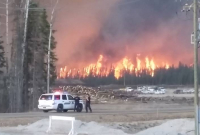Support strong Canadian climate journalism for 2025
Temperatures this summer are expected to feel like "whiplash," and may swing between hot and cool over the course of the season, a top meteorologist says.
The Weather Network released its summer forecast Tuesday, and chief meteorologist Chris Scott said it may feel like being on a teeter−totter.
"When you’re going down, before you reach the bottom, someone jumps on the other side and you’re jerked right back up again," he said. "That’s what our weather patterns are going through. They’re getting kind of jerked around by the overall patterns in the Pacific Ocean with El Nino."
Scott said that while British Columbia has had a cool spring, that should turn around for summer and it’ll end up being a little warmer than average — though he notes that it shouldn’t be excessively hot.
And he said precipitation−wise, the region should get the average amount of rain — which is to say, not a ton. Scott said it could present an issue for forest fires.
In the Prairies, temperatures will vary by the region. Scott said Alberta could get some of the same warm temperatures as British Columbia, but the eastern Prairies can expect it to be cooler than average.
And while there may be a few dry pockets, meteorologists aren’t predicting any prolonged droughts.
Scott said it won’t be as hot or dry in Central Canada as last summer.
"We will be on that battle ground, between warm to the south — and hot, humid weather at times — and cool to the north," he said. "We’re painting in much of northern Ontario with below normal temperatures, most of southern Ontario with near−normal and just a little bit of southern Quebec at above−normal."
"Versus last summer, I wouldn’t say a cooler summer — let’s just say not as hot," he said, adding there won’t be quite as many days above 30C as there were in Toronto last year.
In terms of precipitation, he said it may be a little bit above normal, though the regions affected by flooding in the spring likely won’t have to worry about further issues in the summer.
Meanwhile, Scott said the southern parts of the Maritimes will be a little bit above normal temperature−wise.
But he added that in Newfoundland and Labrador, it may be chillier than average whenever there’s a wind coming off of the ocean, which is cooler this year than it usually is.
In the North, Scott said Yukon can look forward to a warmer than normal summer.
Much of the Northwest Territories will see near normal temperatures, but southern Nunavut should expect a cooler season than usual.





Comments